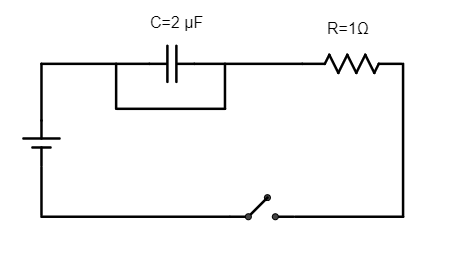
Find the capacitive time constant of the RC circuit shown in the figure.
a) $0$
b) $\infty $
c) $2{\text{s}}$
d) $2\mu {\text{s}}$
Answer
233.1k+ views
Hint: The capacitor is shorted in the circuit diagram. This suggests that the potential difference across the capacitor is zero.
Formula Used: Time constant of the circuit is $\tau = RC$
Complete step by step answer:
Step 1: Explain the circuit diagram.
Step 2: Determine the time constant of the circuit.
Additional Information: When an increasing DC voltage is applied to a discharged capacitor, the capacitor charges up. When the voltage decreases the capacitor again discharges. This charging and discharging of the capacitor energy never happens in an instant. It takes some amount of time for the capacitor to charge or discharge to a specific percentage of its maximum supply value. This time is known as the time constant $\tau $. If the capacitor in the above RC circuit was not shorted, then the capacitor would have gradually charged up through the resistor until the voltage across the plates reached the supply voltage.
Note: Time constant represents the speed at which a system responds to change. Or, in this case it represents how fast the capacitor charges through the resistor. Here, the time constant is infinity. This means that the capacitor does not charge at all.
Formula Used: Time constant of the circuit is $\tau = RC$
Complete step by step answer:
Step 1: Explain the circuit diagram.
A capacitor of $C = 2\mu {\text{F}}$ is connected in series with a resistor of resistance $R = 1\Omega $ and connected to a battery. The capacitor is shorted.
Step 2: Determine the time constant of the circuit.
Time constant of the circuit is given by $\tau = RC$ .
Since the capacitor is shorted, the potential difference between the two plates will be zero.
We know that $C = \dfrac{Q}{V}$ .
Now, potential difference $V = 0$ .
This implies that $C = \infty $ .
Hence $\tau = R \times \infty = \infty $ .
Therefore, the correct option is b)$\infty $ .
Additional Information: When an increasing DC voltage is applied to a discharged capacitor, the capacitor charges up. When the voltage decreases the capacitor again discharges. This charging and discharging of the capacitor energy never happens in an instant. It takes some amount of time for the capacitor to charge or discharge to a specific percentage of its maximum supply value. This time is known as the time constant $\tau $. If the capacitor in the above RC circuit was not shorted, then the capacitor would have gradually charged up through the resistor until the voltage across the plates reached the supply voltage.
Note: Time constant represents the speed at which a system responds to change. Or, in this case it represents how fast the capacitor charges through the resistor. Here, the time constant is infinity. This means that the capacitor does not charge at all.
Recently Updated Pages
JEE Main 2023 April 6 Shift 1 Question Paper with Answer Key

JEE Main 2023 April 6 Shift 2 Question Paper with Answer Key

JEE Main 2023 (January 31 Evening Shift) Question Paper with Solutions [PDF]

JEE Main 2023 January 30 Shift 2 Question Paper with Answer Key

JEE Main 2023 January 25 Shift 1 Question Paper with Answer Key

JEE Main 2023 January 24 Shift 2 Question Paper with Answer Key

Trending doubts
JEE Main 2026: Session 2 Registration Open, City Intimation Slip, Exam Dates, Syllabus & Eligibility

JEE Main 2026 Application Login: Direct Link, Registration, Form Fill, and Steps

Understanding the Angle of Deviation in a Prism

Hybridisation in Chemistry – Concept, Types & Applications

How to Convert a Galvanometer into an Ammeter or Voltmeter

Understanding Uniform Acceleration in Physics

Other Pages
JEE Advanced Marks vs Ranks 2025: Understanding Category-wise Qualifying Marks and Previous Year Cut-offs

Dual Nature of Radiation and Matter Class 12 Physics Chapter 11 CBSE Notes - 2025-26

Understanding the Electric Field of a Uniformly Charged Ring

JEE Advanced Weightage 2025 Chapter-Wise for Physics, Maths and Chemistry

Derivation of Equation of Trajectory Explained for Students

Understanding Electromagnetic Waves and Their Importance




